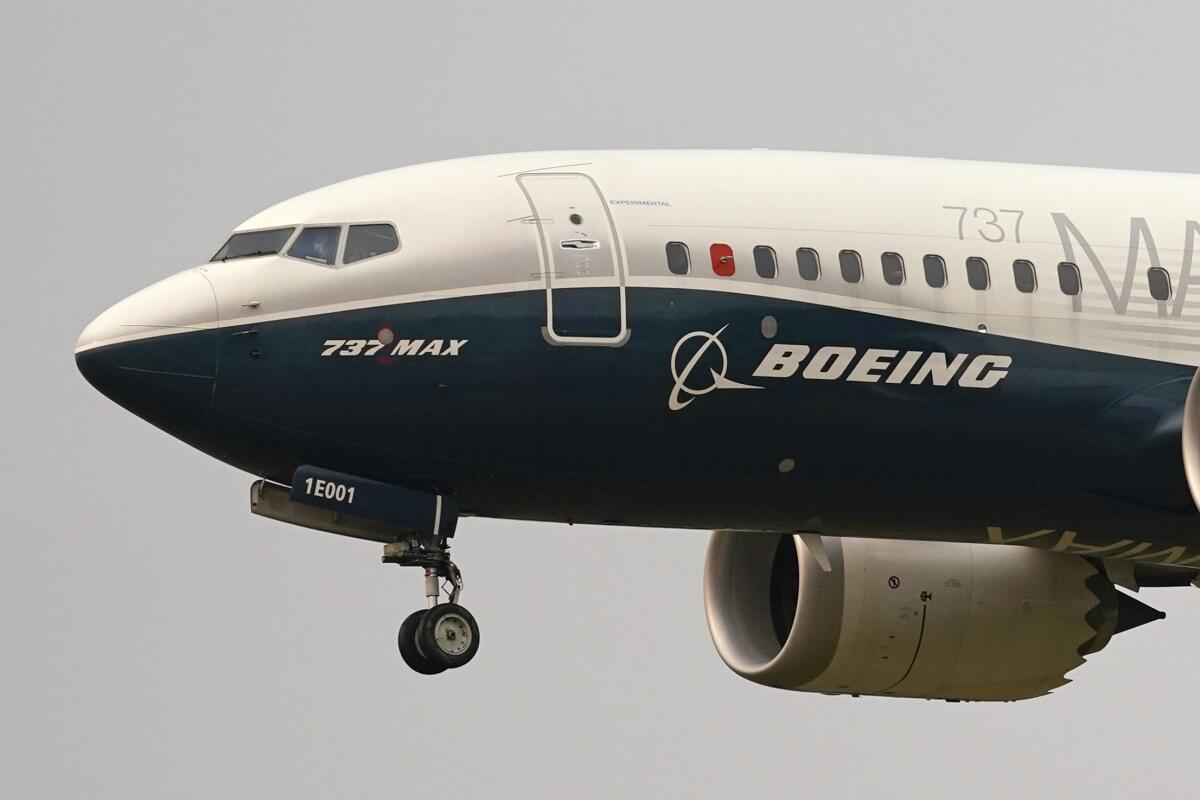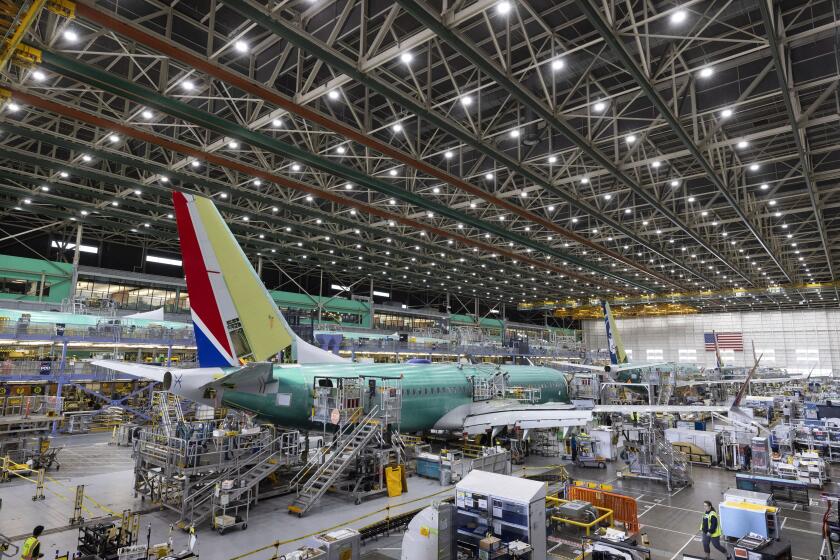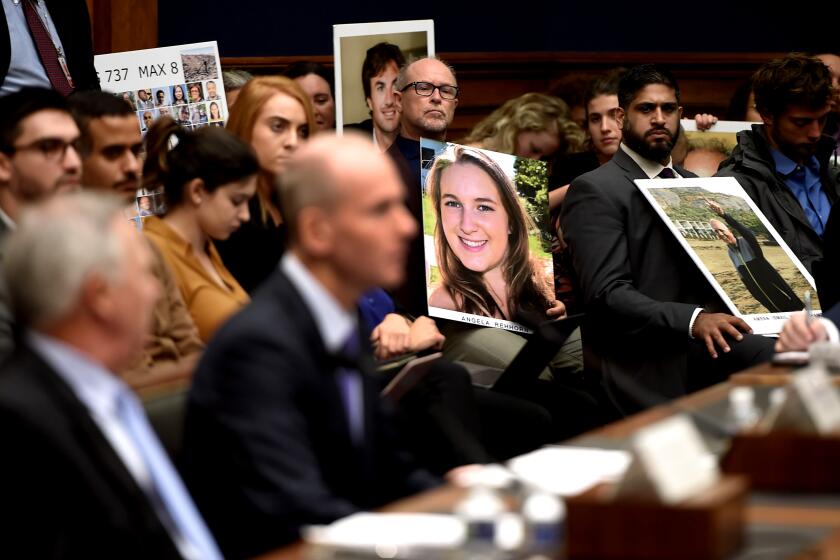Boeing pleads not guilty in case over deadly Max crashes

Boeing pleaded not guilty on Thursday to a charge that it misled regulators who approved its 737 Max, the plane that was involved in two crashes that killed 346 people.
Family members of passengers who died gave emotional testimony, calling for criminal prosecution of top Boeing officials.
The families are trying to persuade a federal judge to throw out a settlement that the company reached with the federal government to avoid prosecution.
U.S. District Judge Reed OâConnor took the plea from Boeing, which was represented by its chief safety officer and a bevy of lawyers, and ordered the company not to break any laws for the next year.
The judge delayed ruling on a request by the families to appoint a special monitor to examine safety issues at the aerospace giant. Boeing and the Justice Department opposed the request.
Boeing will pay $200 million to settle charges that it misled investors about the safety of its 737 Max jets after two of the planes crashed, killing 346 people
Investigations into the 2018 and 2019 crashes pointed to a flight-control system that Boeing added to the Max without telling pilots or airlines. Boeing downplayed the significance of the system, then didnât overhaul it until after the second crash.
The Justice Department investigated Boeing and settled the case in January 2021. After secret negotiations, the government agreed not to prosecute Boeing on a charge of defrauding the United States by deceiving regulators who approved the plane. In exchange, the company paid $2.5 billion â a $243.6-million fine, a $500-million fund for victim compensation, and nearly $1.8 billion to airlines whose Max jets were grounded.
The families are still stunned.
âWe want to see real justice, and that has to be prosecutions for manslaughter,â said Naoise Connolly Ryan, whose husband, Mick, was killed in the second crash.
Naheed Noormohamed, who lost his father, Ameen, on the same flight, said the Justice Department had failed the families by not considering their pain.
âThis is not just a failure of justice, itâs a failure of humanity,â he testified.
âIâm the only voice left in my family,â said Paul Njoroge, a Kenyan-born Canadian whose wife, three small children and mother-in-law all died in the second crash.
Some relatives showed pictures of their loved ones to the Boeing team. They described empty spaces at special family events, and the grief of going to Ethiopia to collect remains. Many of them fought back tears as they addressed the judge.
The fate of the settlement could rest with OâConnor. The judge carved a path for the families to challenge the settlement by ruling last October that the Justice Department had violated federal law by not consulting with crime victims before what amounted to a plea deal.
Separately, the families have asked OâConnor to throw out part of the settlement that gave Boeing immunity from prosecution. That would give families more leverage to lobby the Justice Department to reverse its earlier decision and prosecute the company. The judge has not ruled on the immunity question.
Before Thursdayâs hearing, the families asked the judge to impose three conditions on Boeing, much as he might on any criminal defendant during an arraignment.
One â the break-no-laws directive, a standard order â was granted. However, Boeing and the Justice Department joined ranks to oppose the other two proposals: the special monitor, and the appointment of three passenger advocates who would make a public report about the company.
Paul Cassell, a lawyer for the families, said the extra oversight was needed because families donât trust the Justice Department.
Lawyers for Boeing, which is based in Arlington, Va., and the government countered that such steps were unnecessary because the company has been following terms of the settlement, called a deferred prosecution agreement, for two years.
Mark Filip, a lawyer for Boeing, said the governmentâs supervision of the agreement is ârobustâ and working. Another Boeing attorney, Benjamin Hatch, said representatives from the company and the Justice Department meet at least monthly: âItâs very real oversight.â
Boeing has faced civil lawsuits, congressional investigations and massive damage to its business since the crashes in Indonesia and Ethiopia.
Before each crash, an automated flight-control system called MCAS pushed down the planeâs nose based on faulty readings from a single sensor.
Boeing blamed two former test pilots for misleading Federal Aviation Administration officials about the system. One of the test pilots is the only person prosecuted in connection with the Max. A jury in OâConnorâs courtroom found him not guilty last year.
Relatives of the passengers called him a scapegoat and alleged that flaws in the Max were caused by top executives, led by then-Chief Executive Dennis Muilenburg, instilling a culture of putting profit before safety.
More to Read
Inside the business of entertainment
The Wide Shot brings you news, analysis and insights on everything from streaming wars to production â and what it all means for the future.
You may occasionally receive promotional content from the Los Angeles Times.












